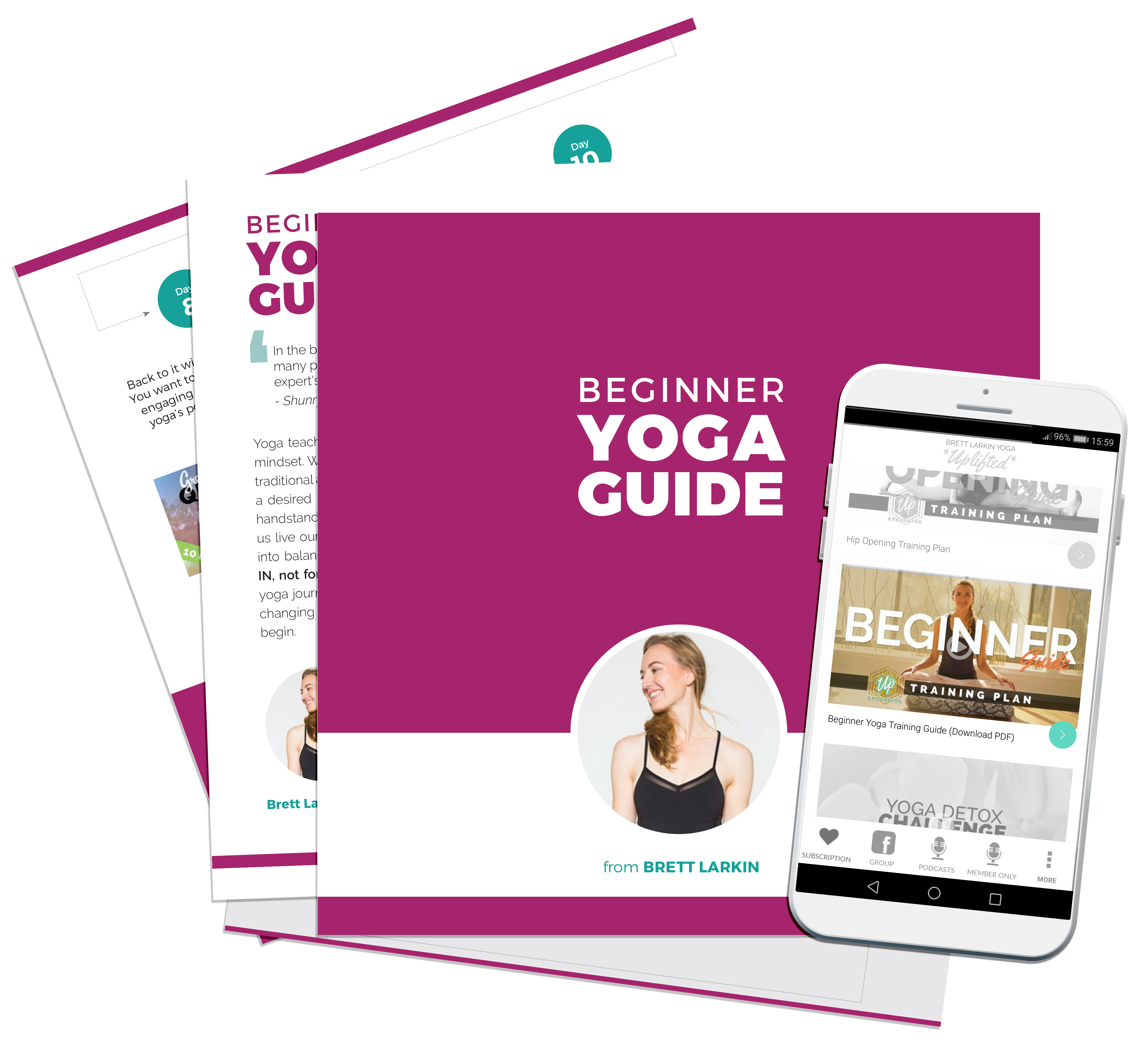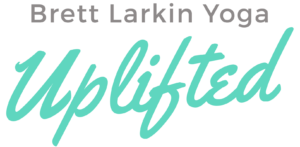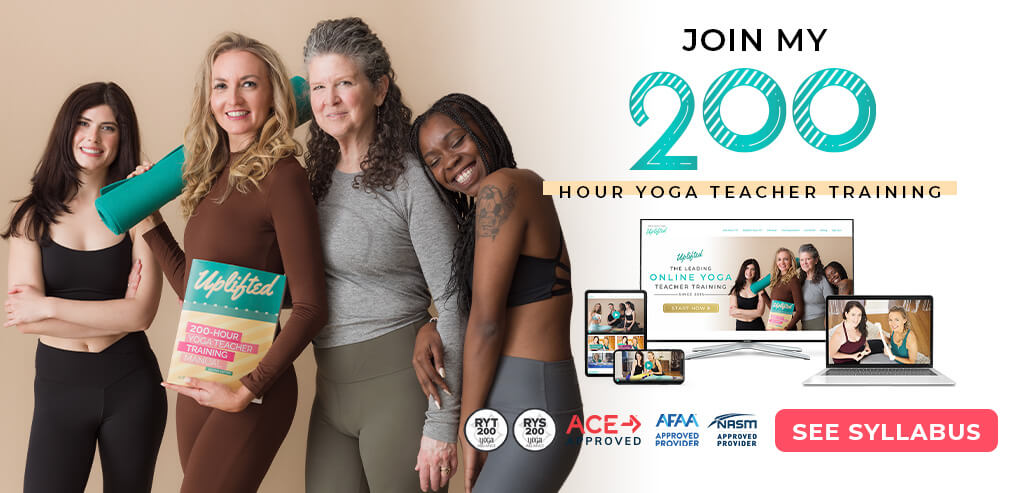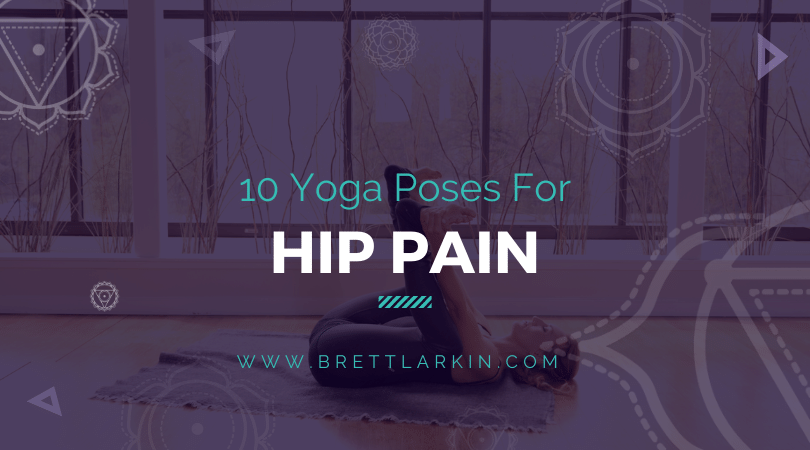
You know what they say…
Nothing is certain but death and taxes—and pain!
At least…I’m pretty sure that’s the saying, right? Or maybe it should be LOL!
Because it’s an inevitable part of life and right now many of us are dealing with pain more than before.
Maybe this feels like a bit of a downer so far, but here’s the good news: Yoga practice can help us with pain!
We’ll first walk through some dynamic yoga asanas for building strength before unwinding with some hip-opening yoga pose goodness.
And for the cherry on top, we’ll use the breath throughout to up-level the melting of our mental and emotional tension too! —YUM!
Please note that while many of these hip openers still work with things like mild arthritis, consult with your physician first if you have hip bursitis, a labral tear, or other hip injuries. And remember that we do yoga to help and to heal! Move within the range of mild to moderate sensation and avoid sharp sensation within the hip socket itself and you won’t have to worry about a yoga injury.
Okay, ready for some happier and healthier hips?
I know I am!
So grab your mat and let’s go!
1. Hip Circles
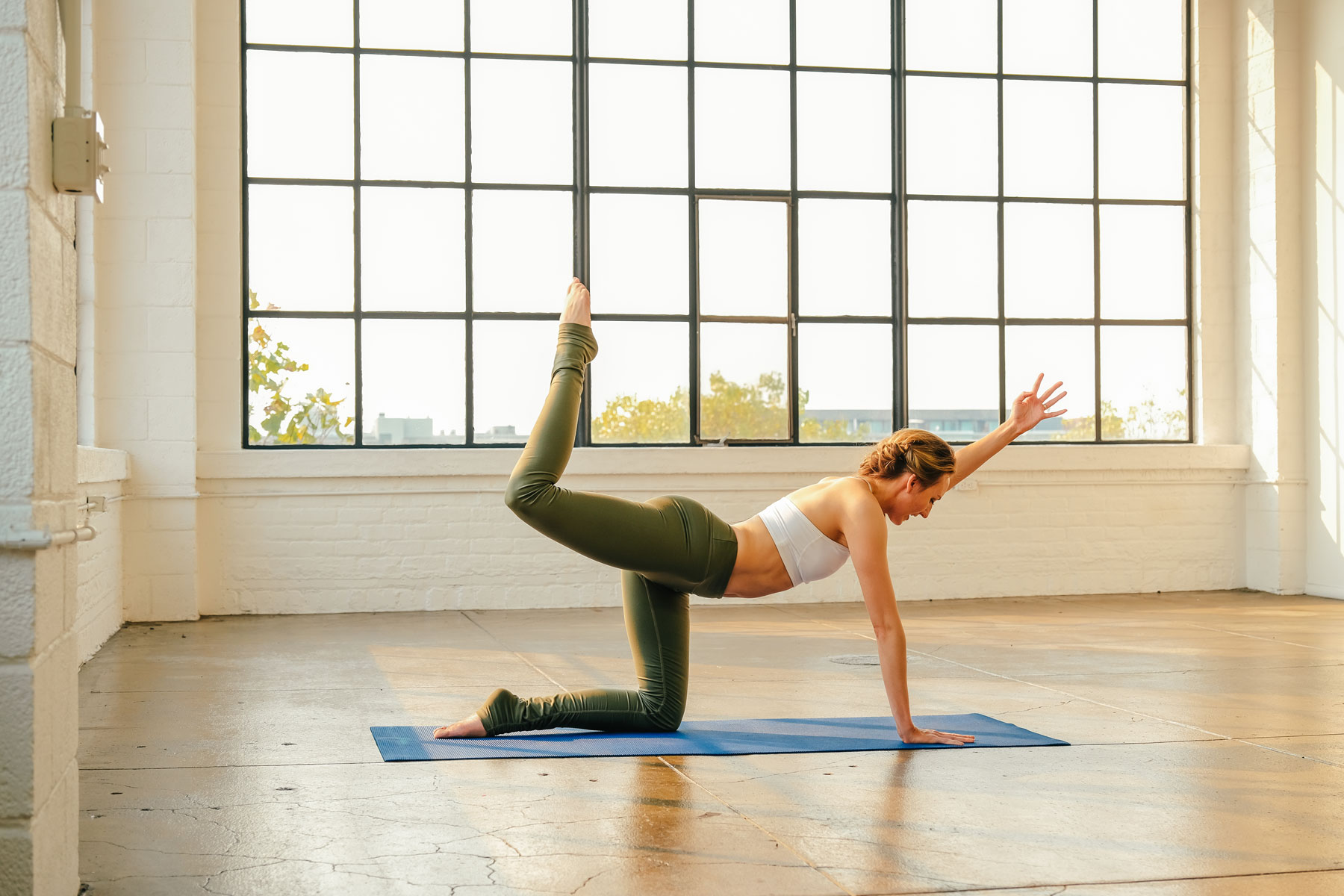
What it does: Warms-up the hip muscles while gently lengthening and strengthening the muscles around the hip joint.
How to do it: Start on your hands and knees, then keep your right knee bent at 90 degrees and lift it up and back to level of your right hip. Make 5-10 slow circles with your knee in one direction and then 5-10 in the other direction. Maintain the 90-degree bend in your knee, work within a comfortable range of motion, and engage your abdominal muscles throughout to protect your lower back. Be sure to enjoy for an equal amount of time on your left hip!
2. Boat Pose (Navasana)
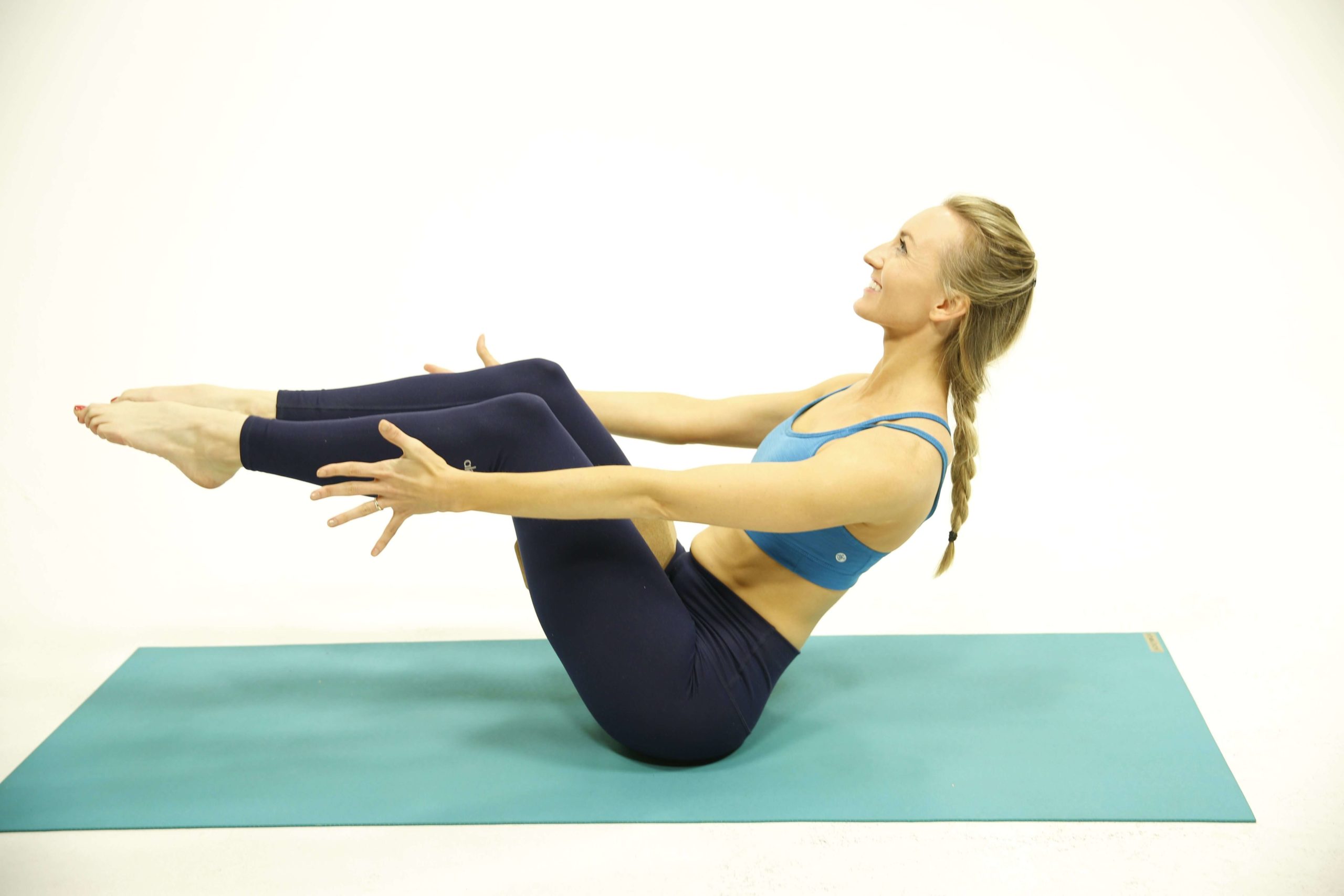
What it does: Tones the core, abdominal muscles, psoas muscles, and hip flexor muscles.
How to do it: Come into a seated position with your knees bent and your feet flat on the floor. Hold lightly behind your thighs as you lift your chest and elongate your spine. Keep your spine straight as you rock slightly back on your sitting bones and engage your abdominal muscles to lift your shins. Keep your shins parallel to the ground and hold for five steady breaths. For more challenge, let go of your legs and extend your arms forward and/or straighten your legs to make a “V” shape with your body.
3. Humble Warrior (Baddha Virabhadrasana)
What it does: Strengthens the quadriceps, hamstrings, and glutes while softening the inner thighs.
How to do it: From Warrior I with the right leg forward, widen your stance, clasp your hands behind your back, and lift your chest. Keep lengthening through your spine as you fold forward, bringing your right shoulder just inside your inner right thigh or slightly higher. Press into your right heel and the knife-edge of your left foot to activate your glutes. Keep squeezing your shoulder blades together and extending through your hands as you take five slow breaths. Press firmly into your front leg to carefully come out and repeat on the other side. For a gentler variation, place your hands on the ground or onto some blocks inside of the right foot to support the weight of the torso.
4. Dynamic Bridge Pose Variation (Setu Bandha Sarvangasana)
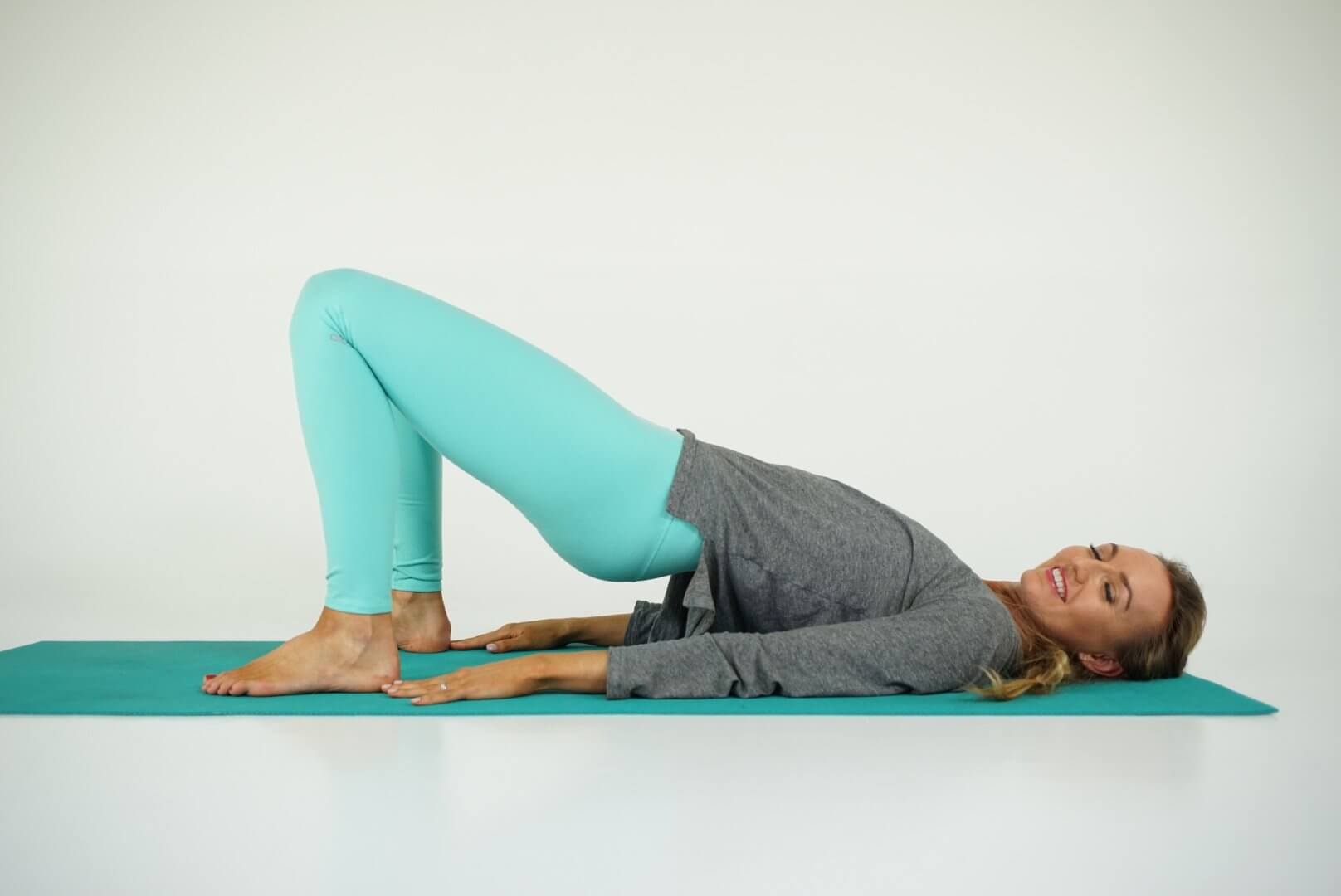
What it does: Tones the quadriceps, hamstrings, inner thighs, outer hips, and gluteus medius while lengthening the psoas muscles and hip flexor muscles.
How to do it: Lie on your back, bend your knees, and plant your feet near your hips so you can just touch the backs of your heels with your fingertips. Bring your feet together and place your arms by your sides to stabilize your upper body. Follow this four-part sequence: (1) lift your pelvis (2) separate your knees as far as is comfortable (3) rejoin your knees (4) lower your hips. Move through each part slowly and repeat 10 times. If you have knee pain in this pose, explore taking the feet wider, turning the toes out a touch, or not lifting your hips as high.
5. Dynamic Butterfly Pose Variation (Baddha Konasana)
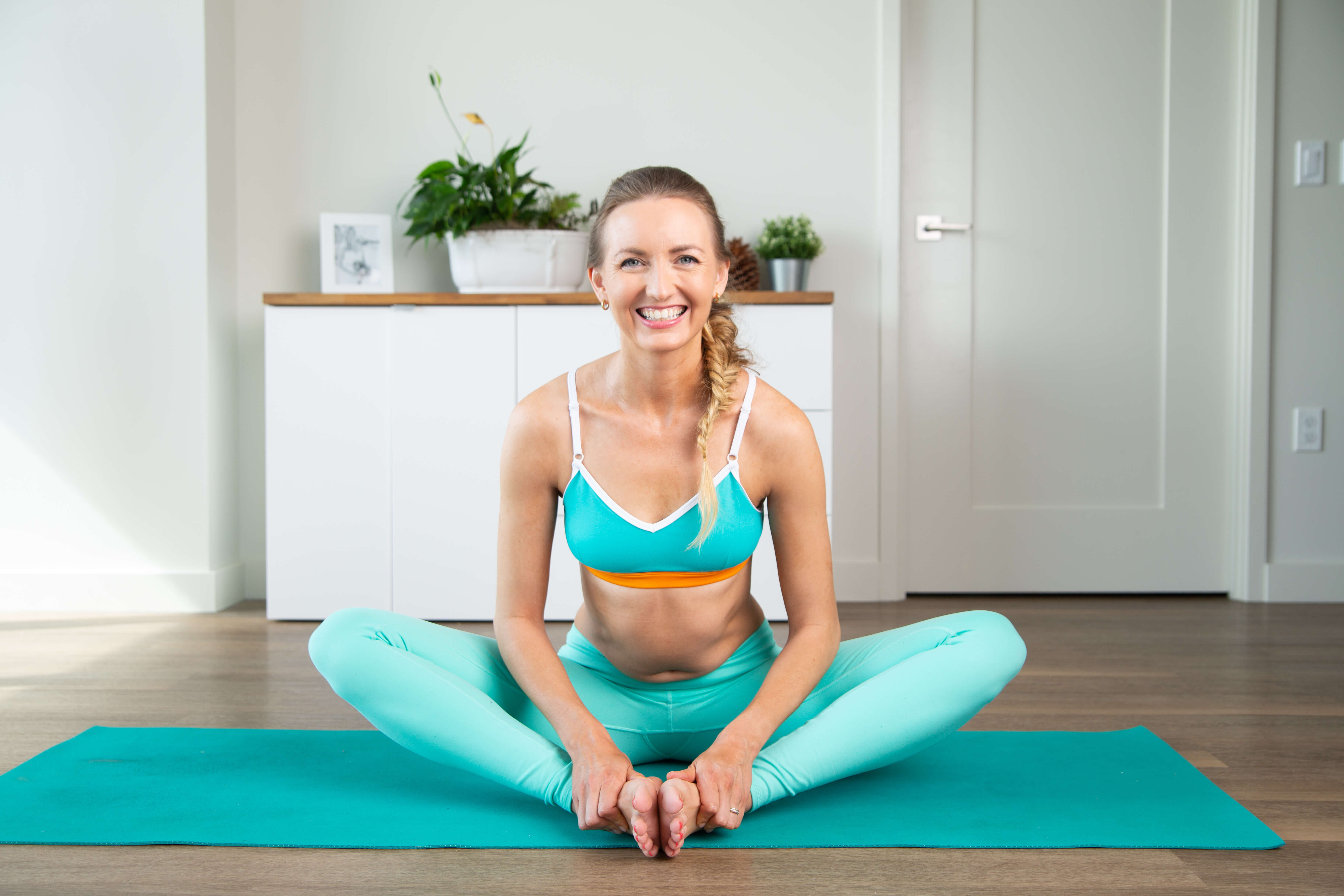
What it does: Strengthens the inner thigh muscles then loosens the lower back, hamstrings, hip flexors, and inner thighs.
How to do it: From seated, bring the soles of your feet together at a comfortable distance away from your body and let your knees drop wide to make a diamond shape with your legs. Lightly clasp your feet with your hands then slowly lift both knees into the light resistance of your elbows and slowly lower 10 times. Next, come into a passive stretch by tilting the top of your pelvis forward, placing your hands on the ground in front of your feet, and straightening your spine. Then maintain a flat back as you walk your hands forward until you find a stretching sensation in your thighs. Hang out there for 5-10 slow breaths.
Want to see more yoga poses? Check out my yoga pose directory to find more yoga postures for your practice.
6. Low Lunge Pose (Anjaneyasana)
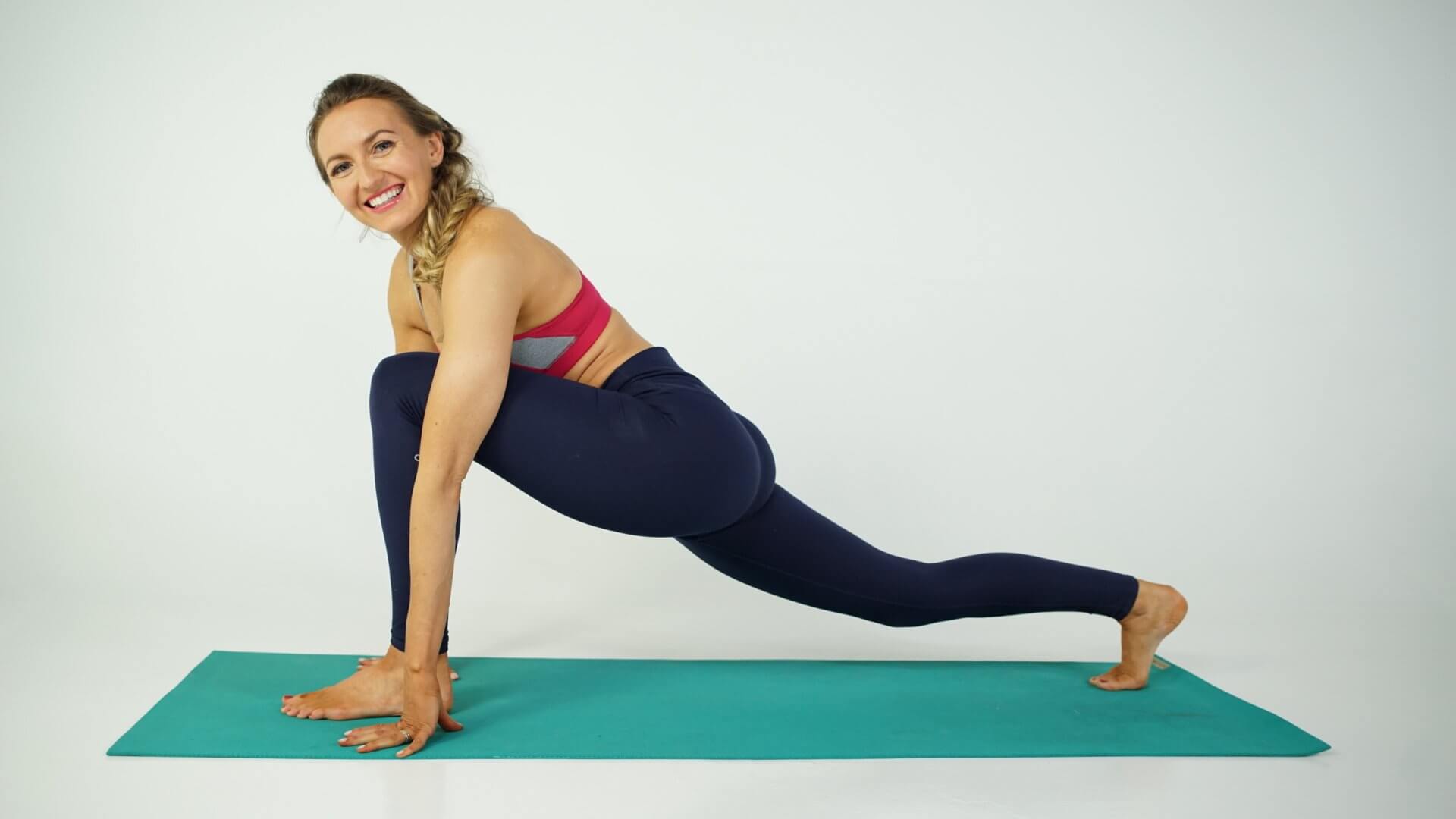
What it does: Opens the hip flexors and psoas muscles.
How to do it: Begin in tabletop position and bring your right foot forward in between your hands with the right knee on top of the ankle. Slide your left knee back slightly then bring your hands onto the front thigh or place them on blocks near your hips. Let your hips sink and glide forward until you feel a mild stretch in the front of the left leg and hip area. Breathe easy here for 5-10 breaths on each side.
7. Reclined Pigeon/Ankle to Knee (Supta Kapotasana)
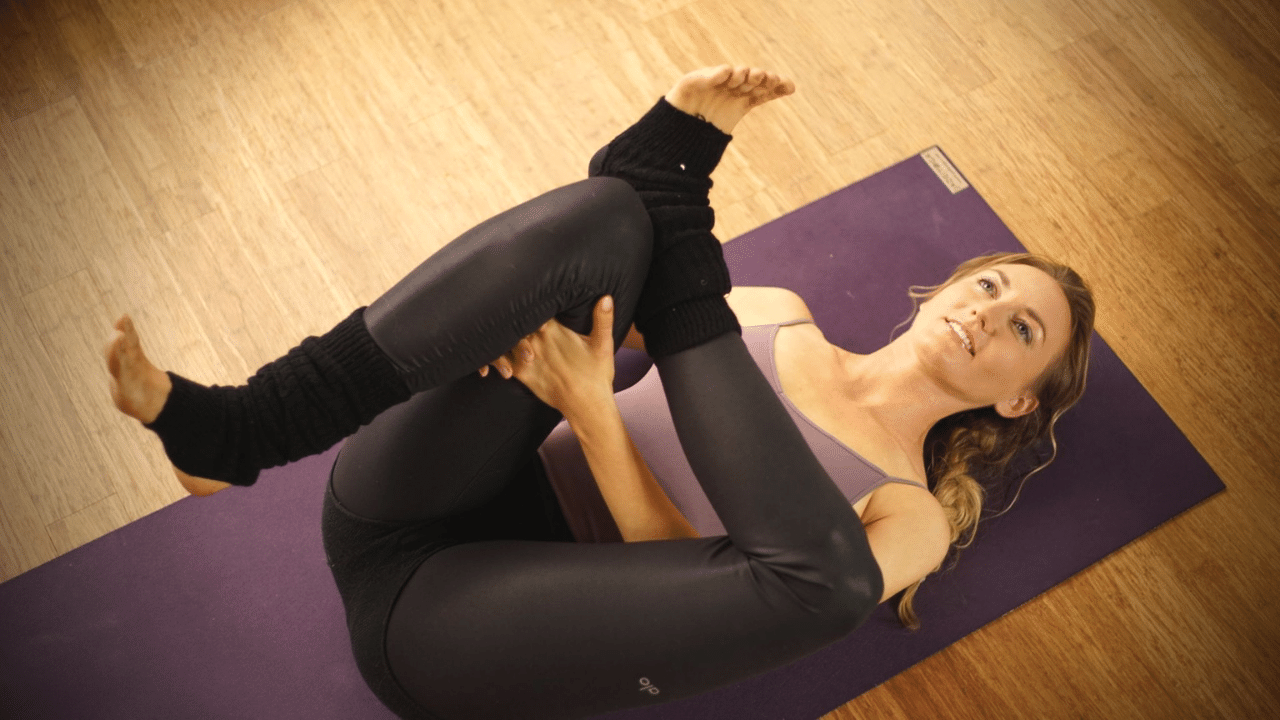
What it does: Stretches the outer hips, gluteus medius, inner thighs, and hamstrings.
How to do it: Start lying on your back with your knees bent and your feet on the floor. Place your right ankle on your left knee and keep the ankle flexed. Activate your abdominal muscles to bring your thighs towards your chest until you can clasp your hands behind the left thigh. For more stretch, clasp your shin or maintain the figure-4 shape in your legs and lower your right foot towards (or to) the floor on the left side of your mat. Lounge in your variation for 5-10 breaths and repeat on the other side.
8. Reclined Twist (Jathara Parisvartanasana)
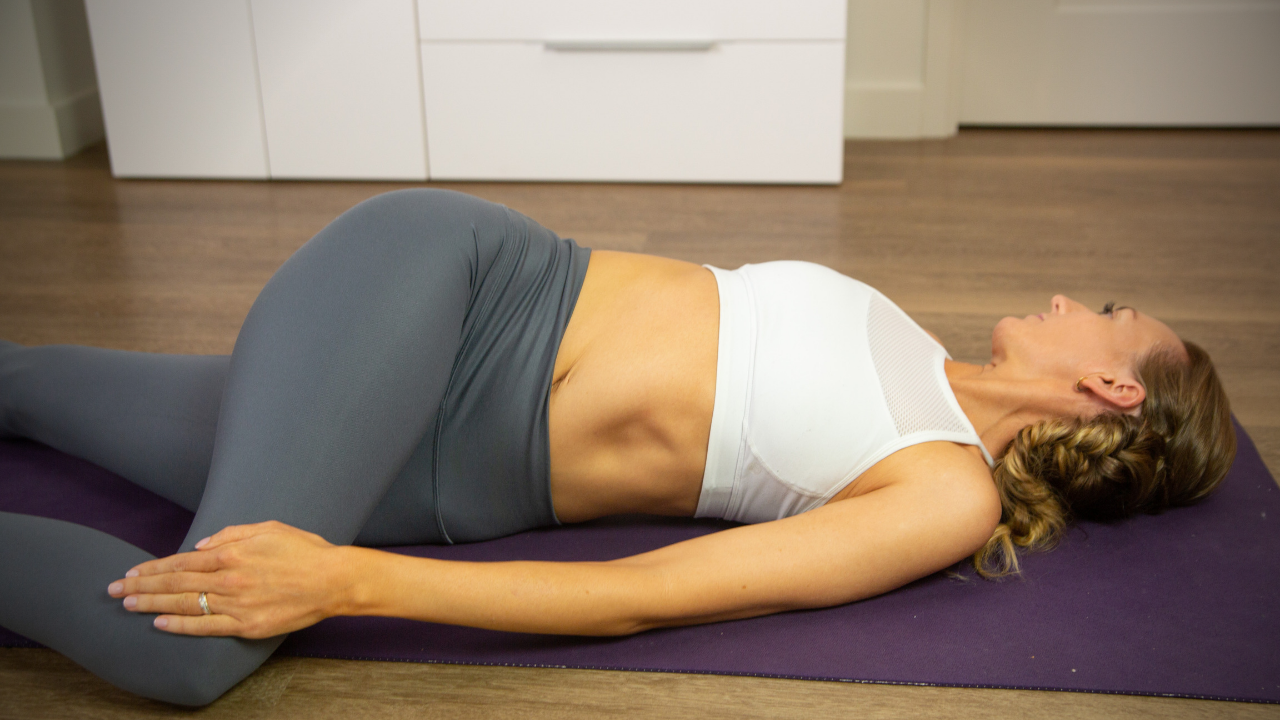
What it does: Stretches the outer hips and glutes and realigns the spine.
How to do it: Lie on your back with your legs extended then bring your right knee into a 90-degree angle. Keep a slight arch in your lower back and your upper body flat on the floor as you use the left hand on the outer right knee to guide your knee across your body towards the left side of your mat. For more support, you can place a block or blanket under your right knee. For more stretching, explore straightening your right leg to lengthen the IT band and/or bend your left leg and hold the left foot with your right hand to stretch your left side quadriceps and hip flexors. Tay here for 5-10 slow breaths and repeat on the other side.
9. Happy Baby (Ananda Balasana)
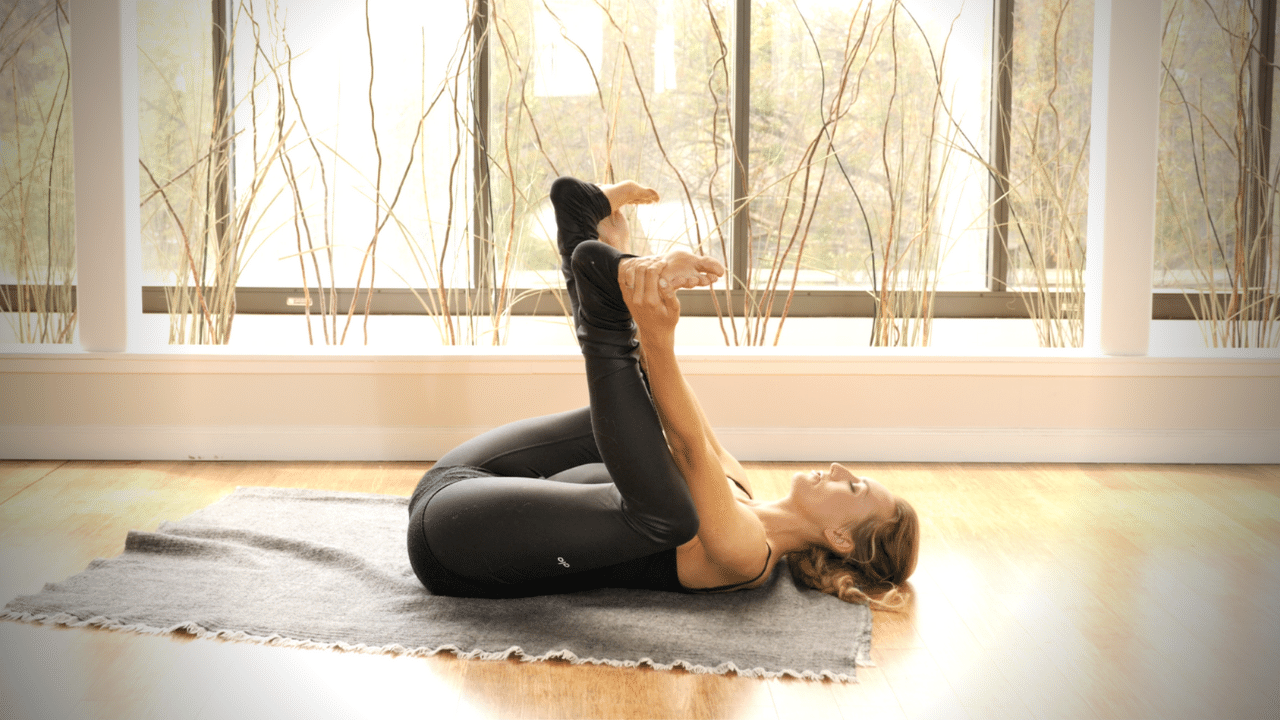
What it does: Releases the lower back, hamstrings, inner thighs, and outer hips.
How to do it: Lie on your back and bring your knees towards your armpits as you hold onto your outer shins, ankles, or feet. Fun options here are to gently rock side to side to massage the lower back or to stretch one leg straight and then the other to open the hamstrings. Play here for 5-10 breaths.
10. Legs Up The Wall Variation (Viparita Karani)
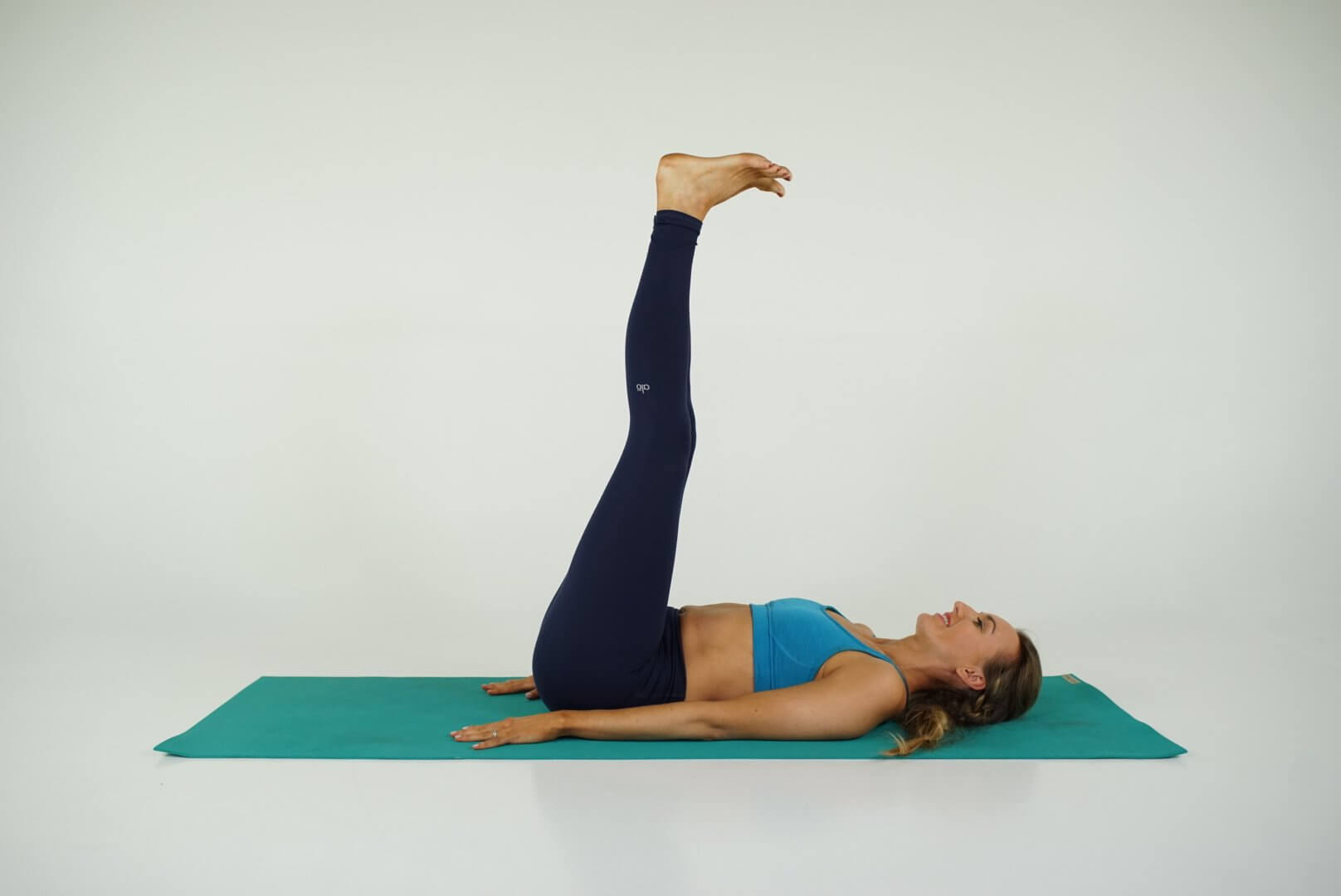
What it does: Softens the lower back and hips flexors and calms the nervous system.
How to do it: Sit in front of a chair and lean back onto your hands as you place your shins onto the seat. Use your hands for support in bringing your hips close to the chair so they are underneath your knees and then lie onto your back. Choose a chair or surface with a height that creates a 90-degree bend in your knees so your shins are parallel with the floor. For a more calming effect, place a folded blanket under your hips to enhance this gentle inversion. For the most benefit, cover yourself with your favorite cozy blanket and rest here for 3-10 minutes while taking super slow belly breaths to release stress, soften the hips, and soothe the nervous system.
Final Thoughts
All of our sitting plus higher stress levels are the perfect cocktail for a literal pain in the butt! Less movement leads to weak hip muscles while more sitting and mental tension result in tight hip flexors, tight hamstrings, and tight glutes. All of these factors contribute to our hip joint pain. Because our bodies are so interconnected, hip tightness can also contribute to discomfort in other areas (lower back or knee pain anyone?) Since yoga empowers us to take our physical care more into our own hands, YOU have the power to help liberate your locked-up hips!
Experience 3 Training Videos from Inside My 200-Hour Online YTT
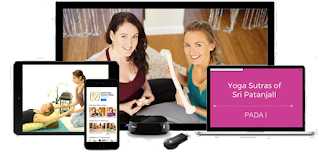
YOU MIGHT ALSO LIKE
- What is Kriya Yoga? The Philosophy and Practice
- Uddiyana Bandha: Tapping Into Your Deep Core
- 4 Reasons Hasta Bandha Is Essential To Your Yoga Practice
- Vitarka Mudra: What It Is and How Do You Use It?
- Shakti Mudra: What It Is and How Do You Do It?
- Garuda Mudra: What It Is and How Do You Use It?
- Kali Mudra: What It Is and How Do You Do It?
- Shunya Mudra: What It Is and How Do You Do It?
- Varuna Mudra: What It Is and How Do You Use It?
- Vayu Mudra: What It Is and How Do You Use It?
- Samana Vayu: The Energy of Balance & How to Access It
- Apana Vayu: The Energy of Release & Surrender
- Udana Vayu: The Ascending Wind
- Prana Vayu: The Breath of Vitality
- Vyana Vayu: The Energetic Secret to Flow
Learn how to do 11 of the most popular yoga poses correctly. Free video + PDF download.
